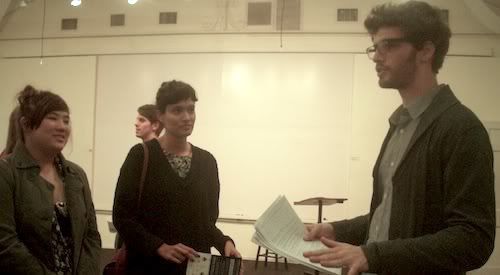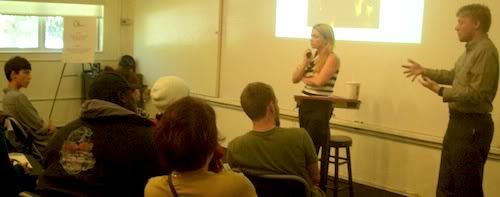by Adrian Fernandez-Morrell
As a child in elementary school, I was blissfully unaware that indoctrination into my “correct” gender role was already well on its way. My father, who took on the role of teacher, was determined to transform me into the same image of a “real man” he was given by his father - one of toughness, force, and stoicism.
A “real man” would strike anyone in the mouth for the slightest sign of disrespect. “Punch ‘em” was my father’s go-to advice whenever I had a problem with someone. “When I was your age,” he explained, “and some kid did that to me, I gave them a bloody nose. You better believe he never messed with me again.”
 |
| Adrian (right) at YES Institute's Masculinity Distinguished course. |
I continued to play, oblivious to the meanings the world attached to my actions. I bear-hugged my best friends, because they were my best friends. One time, I walked an imaginary runway in my mother’s high heels to which she said, “You’re really good at walking in those. Just don’t let your father ever see you wearing them.” I put on my grandmother’s clip-on earrings and was scolded by my father, “Take those off! Ladies wear earrings.” The lessons seemed never ending: Don’t be a fairy, don’t be a sissy, don’t be a little girl, suck it up, be a man, stop whining. “My father used to hit me, and you’d never see me cry," my father would say. According to my father, I was going about the business of manhood all wrong.
Despite my resistance, the “boys don’t do that” lessons of my childhood began to take root. I wanted to be a man. My father was strong, so I wanted to be strong. I took pride in his strength, punching him in the stomach (only with his permission) to see how his mighty abdomen could absorb the blow, but also to see if I had become strong enough to inflict some degree of pain.
In college, my father felt it necessary to continue my tutorials to prepare me for the real world. On one of his visits, he noticed a thin layer of pink nail polish on a few of my fingers. His patience had already been exhausted, and a lecture ensued. He swiftly procured nail polish remover, took my hand, and gruffly removed the paint himself. “Do you walk around in public like that? What do people think when they see that? I’ll tell you what I’d think. I’d think that person’s a gay.”
This was not a new phenomenon. I was called gay frequently growing up. Much to my chagrin, quite a few acquaintances called me by the unwarranted sobriquet, “Gaydrian.” This was a recycled pestering used on any and every victim - I wasn’t bullied or ridiculed, because people actually thought I was gay; it was just the insult of choice. Not every kid sees it this way. For kids like Carl Joseph Walker Hoover and Jamey Rodemeyer, relentless bullying was a death blow.
Even as an adult, people still assume I’m gay. I don’t think I exhibit characteristics that would make others think this of me, and yet, it happens. After taking Masculinity Distinguished, I see how all of those lessons about masculinity my father tried so hard to bestow are at the root of it all. I’m still processing the impact of this course, but I know that I left YES Institute that day feeling lighter, freer. I get it.
 |
| Brittney McCabe and Joseph Zolobczuk (right) in November's Masculinity Distinguished course. |
We invite you to Masculinity Distinguished to look beyond what is assumed and examine the constraints and expectations for the illusive "ideal male". YES Institute begins a fresh inquiry into the meanings of relating in a polarized gender equation. Register for the Saturday, February 25, 2012 class with Brittney McCabe, by calling 305 663-7195.

No comments:
Post a Comment